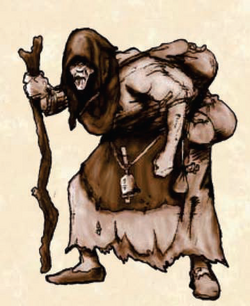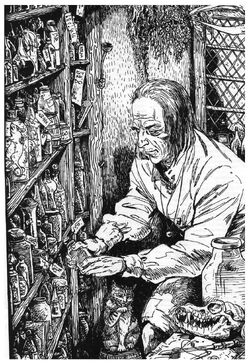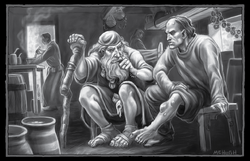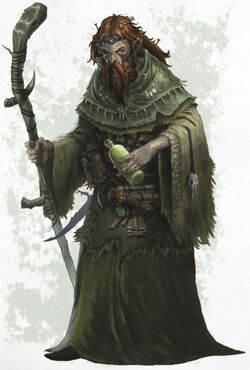"We tell the folk that the offering o' fish is for Grandfather Reik, 'cause it makes them feel safer than having to explain the river is home to an 'ungry spirit. It keeps the spirit safe, too."
- —Alt Zaunreiter, Hedgewise[6a]

A typical hedge wizard found in the rural areas of the Empire.
The term "hedge wizard" or "hedge witch"[6a] refers to a variety of spellcasters who channel the power of magic outside the formal Imperial magic system and bureaucracy overseen by the Colleges of Magic.[5a][6a] By and large, hedge wizards only know a small amount of basic magic [5a] and come from rural backgrounds. In the time before the Colleges of Magic were founded by the efforts of Emperor Magnus the Pious and the High Elf Archmage Teclis after the end of the Great War Against Chaos in 2304 IC, all Human practicioners of magic were considered hedge wizards and were often persecuted by the authorities.[1a]
Most hedge wizards dwell in villages, making their livings as healers. In fact, most claim not to be magic-users at all, instead professing to be apothecaries or herbalists.[2a] However, hedge wizards are in constant danger. Every day there is a chance that a witch hunter will execute them,[5a] the lure of Chaos will prove too much, their own magic will drive them insane, or some miscast spell will be their undoing.[1e][1f] And this is only if they still have the trust of the local villagers...[1f]
There are three main types of hedge wizards: Those who were apprenticed to other hedge wizards, those who received some education from the Imperial Colleges of Magic but did not complete their education, and those who are completely self-taught.[3a] All hedge wizards have some sort of sensitivity to magic, either instinctive or acquired.[1e]
A Day in the Life[]
"Magic? I don't know anything about that. I'm just a simple herbalist."
- —Typical Hedge Wizard denial[2a]

A hedge wizard practicing herbalism
Hedge wizards use charms, talismans and cantrips to survive, but the cost to them in the end could be disastrous; they are openly sought after and executed by witch hunters, as unlicensed magic use is highly unlawful within the Empire, and viewed with deep suspicion and mistrust within Kislev.[2a]
However, witch hunters are not the only ones that seek them out. In some communities, people seek the assistance of the wise woman, "Crazy Old Hermit" or other local eccentric who seems to have a touch of the mystical to them. In a world filled with superstitions, a hedge wizard may earn a reputation of sorts, as one who can help a community with potions, rituals, and cantrips -- often minor enough to go beneath the notice of all but the most ardent investigation.[2a] However, the village opinion can quickly turn against these eccentrics. It only takes one unintended magical side-effect or suspicious peasant to lead to charges of consorting with "Daemons and the Fay."[1f]
Hedge wizards tend to make a rather poor living for themselves, trading various, charms, cantrips, and blessings they can offer for a few coins, some cloth or a chicken. Hedge wizards must either live a nomadic existence, or be able to trust completely those in their area to not convey, whether accidentally or on purpose, their existence in the community.[2a]
More reliably, many hedge wizards disguise their true nature by professing to be an apothecary or herbalist, claiming for example that the benefits their poultices and potions offer come only from the right combination of ingredients. Under such conditions hedge wizards will never willingly admit to using magic as part of their preparations.[2a] In fact, most hedge wizards do have significant knowledge of herbology, folk medicine, and poultice-making.[1f] However, their practices are mixed with petty magic and quackery.[1e]
If news of a witch hunter reaches a hedge wizard, they are likely to quickly pack their few belongings and flee the village for a few days, until the witch hunter leaves again.[6a]
Most hedge wizards live alone, on the edge of the village and wilderness[6a] with only a pet cat or toad. Others take on apprentices.[3b]
Hedge Magic[]
The "Elementalist Skein," a tradition of hedge wizards, holds that its members, who call themselves "Elementalists", draw their magic from the natural elements.[1a][1b] This conflicts with the publicly accepted theories of the Colleges of Magic.[1b] However, privately, college Magisters may admit that this belief is not so far off the mark. In fact, low levels of "ambient" magic can be drawn out of any number of mundane objects and items. It is theorised that hedge wizards may be channelling this low-power and relatively safe form of magic.[1b][1c]
One advantage that hedge wizards have is that they are not constrained by the rules disallowing collegiate Magisters from tapping into more than one Wind of Magic. In fact, hedge wizards probably have no concept of the Winds of Magic whatsoever. Thus, a hedge wizard may acquire a wide variety of petty spells, from a Ghyran-based crop growth enchantment, to an Aqshy-based fire starting cantrip.[1f][3b][3c]
Many of the petty spells known to hedge wizards are considered child's play by Master Wizards. However, they are somewhat suited to the need of a hedge wizard. For example, the effects of these spells are typically minor, for example wiggling a pin in a lock. This means that the spells are rarely noticed, and if they are, can be explained away as sleight of hand or pure coincidence.[3c]
Lure of Chaos[]
"You know, Rudi, that reminds me. I promised to visit Frau Shimmerling this afternoon to try to call up the spirit of her dear departed mother. There's some argument in the family about who should get the silver spoon, and it seems like the only way..."
- —Hansel Halsenberg, hedge wizard and accused necromancer[3a]
Hedge wizards' practice may verge into Dark Magic without them even realising it. Some are corrupted quickly and decisively, leading to insanity, mutation, visits from Daemons, thirst for power, or travels in search of necromancers or Chaos Sorcerers. In other cases, corruption is more subtle. A hedge wizard may find that they are able to act as mediums, summoning spirits of the dead or tiny imp-like creatures. These too are signs of corruption. Not only are the souls of corrupted hedge wizards in peril, but they are also much easier for a witch hunter to spot.[3c][3d]
The lure of Chaos is constant and appealing. Many hedge wizards begin as benevolent wise women, but end up as vengeful witches, putting curses on rivals' crops, and sacrificing children to prolong their own life. Most hedge wizards, however, exist between these two poles.[3d]
Traditionally-taught Hedge Wizards[]

A member of the Hedgefolk hoping to heal a patient.
Many hedge wizards begin their careers as apprentices to more experienced hedge wizards who were themselves apprenticed in their youth. These traditions of magic may go back hundreds or thousands of years. Most appeared organically over the generations, with new incantations and techniques being added gradually over time.[3b]
Some, however, have their origin in more mysterious and ancient theories of magic, and still retain trace amounts of that power. Scholars often go in search of these traditions, in hopes of recovering such ancient knowledge.[3b]
Examples of traditions of hedge wizardry include the so-called "Elementalist Skein"[1a][1b] and the Hedgefolk.[4a]
College Dropouts[]
"Do you think only Magisters can wield magic? Think again! I, too, have such understanding, and I refuse to become a slave to the so-called Colleges."
- —Apprentice Franz Zimmel of the Gold Order, 3 months before being captured by a witch hunter.[6b]
Some hedge wizards received a bit of education from the Colleges of Magic or another official arcane institution of learning. These wizards ended their education before it was complete, but continue to practice magic using what techniques they learned. Some of these hedge wizards continue to experiment and research, using their formal knowledge as a foundation.[3b]
Self-taught Hedge Wizards[]
It is thought that the majority of hedge wizards are self-taught.[1a][Note 1] These hedge wizards must not only have an innate sensitivity to magic, but also the cleverness and determination to use it. Self-taught wizards are constantly experimenting with magic, learning through trial-and-error. However, aside from some rare exceptions,[3b] the most advanced are only able to repeat ancient experiments considered basic training for apprentices in the Colleges of Magic,[1e][3b] and are unable to progress beyond a handful of simple spells, having no knowledge of the true nature of magic and Chaos.[1f]
Self-taught hedge wizards who are not driven mad by their dabbling or drawn into the services of the Dark Gods often end up dead at the hands of some magic gone awry.[1e][1f] They may be unaware of a spell's pernicious side-effects, or accidentally stumble upon a much more potent enchantment than they intended. On more than one occasion, a hedge wizard corned by a witch hunter has exploded into a column of multicolored flame when they attempted to cast a minor spell of self-defence.[1f]
Magickers, although not always considered hedge wizards, fall into the category of self-taught spellcasters.[1a]
Affiliations[]

A hedge wizard
The witch hunters and other religious authorities consider hedge wizards nothing more than "self-aggrandising witches," and often target them for persecution.[1c][2a] It is relatively easy to catch a hedge wizard -- there are few other solitary eccentrics in rural Imperial society.[1f]
The Colleges of Magic take a somewhat different view of hedge wizards. Anyone who has developed the ability to channel ambient magic is considered prime apprentice material. Thus, Magisters in search of students will be keen to follow up on any rumours of elementalists or petty spellcasters in rural areas. If found, such a hedge wizard will be offered a chance to join an Order of Magic. If the hedge wizard should refuse, they will be executed or pacified, for such an individual would make a dangerous enemy if they should fall to the Ruinous Powers.[1c]
Although it is difficult for most hedge wizards, who are usually illiterate, to study successfully at the Colleges of Magic, they do owe the significant developments in Petty Magic to the hedge wizards who became Magisters in the early days of the colleges.[1f]
Although the communities around them are often suspicious of hedge wizards, some have been known to rise to leadership roles in particularly out-of-the-way localities. However, they must be very careful not to attract the attention of any witch hunters.[1f][3b]
Hedge wizards are usually in competition with any religious forces in their village. A priest would much rather villagers be making offerings to their local church for their sick livestock or distraught relations, rather than taking their business to the local eccentric herbalist. Thus, few villages have both a hedge wizard and a church -- one usually ends up forcing the other out.[3d]
Halfling Hedge Wizards[]
Hedge wizards can be found in the Moot, although it is not as common as in other rural areas of the Empire. Halfling hedge wizards are somewhat different from Human hedge wizards. Their practices involve more herbalism and less true magic than their Human counterparts. Possibly because of this, they are treated with more respect.[3b]
The folk of the Moot are distrustful of collegiate Magisters, and consider their hedge wizards to be important members of the village. Hedge wizards may even gain some sort of official license from their village's mayor, although it is only valid in that particular village.[3b]
Canon Conflict[]
- Note 1: Contradictorily, Realms of Sorcery 1st Edition states that self-taught hedge wizards are the rarest category of hedge wizard.
Sources[]
- 1: Warhammer Fantasy Roleplay 2nd Edition: Realms of Sorcery (RPG)
- 2: Warhammer Fantasy Roleplay 2nd Edition: Career Compendium (RPG)
- 2a: pg. 97
- 3: Warhammer Fantasy Roleplay 1st Edition: Realms of Sorcery (RPG)
- 4: Warhammer Fantasy Roleplay 2nd Edition: Shades of Empire (RPG)
- 4a: pg. 56
- 5: Warhammer Fantasy Roleplay 2nd Edition: Core Rulebook (RPG)
- 5a: pg. 40
- 6: Warhammer Fantasy Roleplay 4th Edition: Core Rulebook (RPG)
